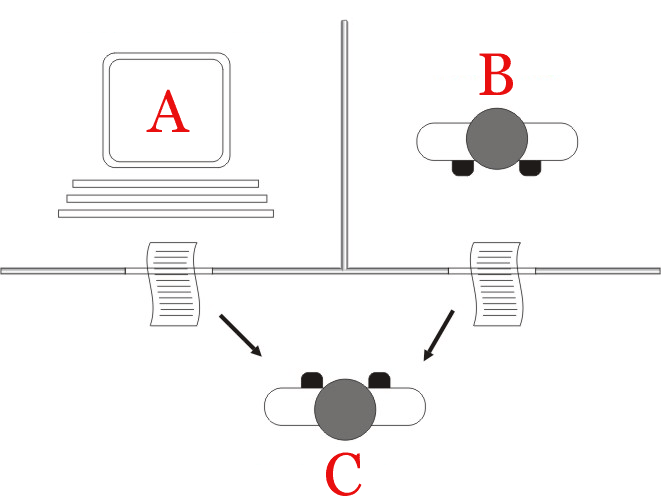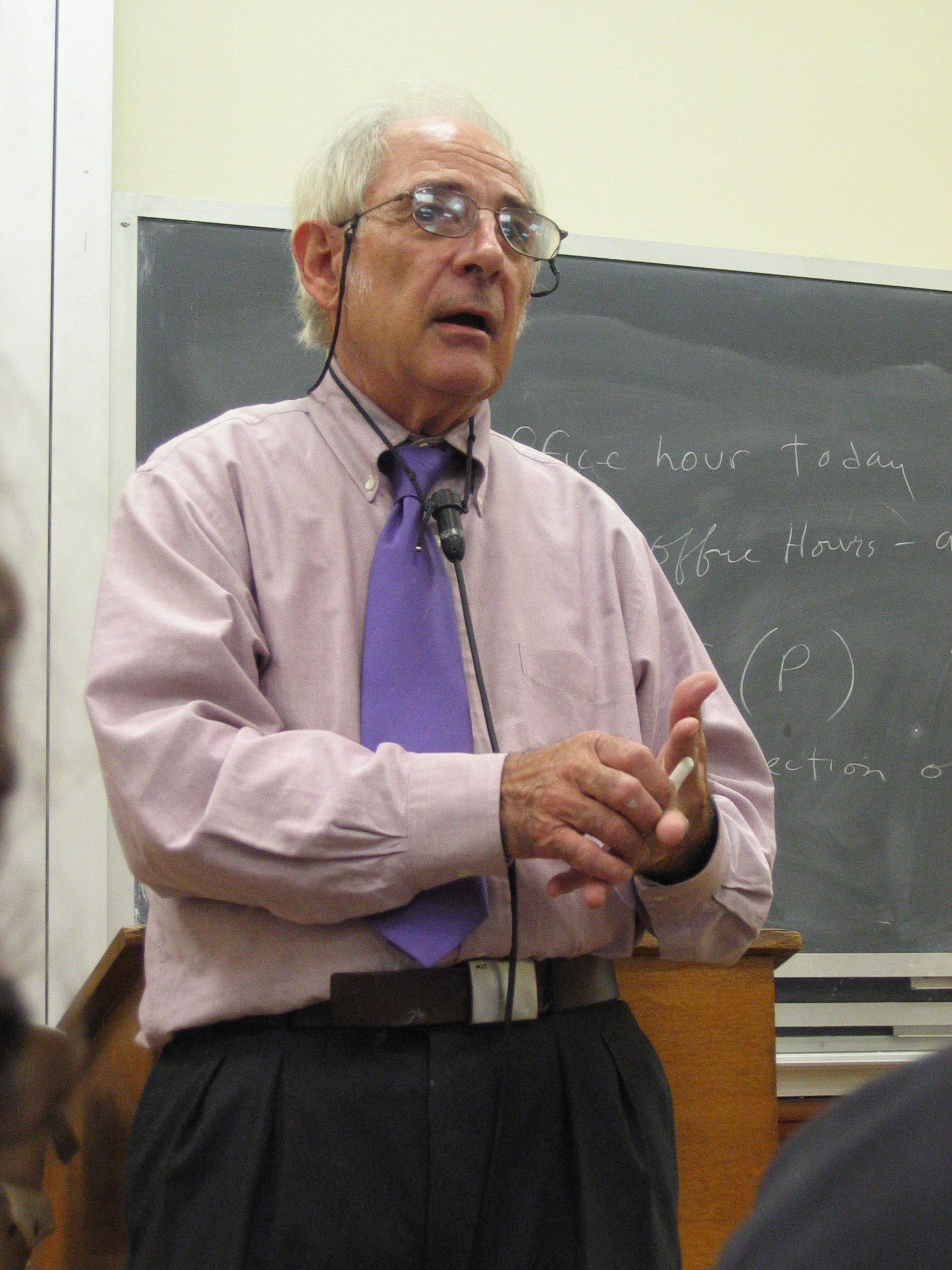|
Blockhead (thought Experiment)
Blockhead is the name of a theoretical computer system invented as part of a thought experiment by philosopher Ned Block, which appeared in a paper titled "Psychologism and Behaviorism". Block did not name the computer in the paper. Overview In "Psychologism and Behaviorism," Block argues that the internal mechanism of a system is important in determining whether that system is intelligent and claims to show that a non-intelligent system could pass the Turing test. Block asks us to imagine a conversation lasting any given amount of time. He states that given the nature of language, there are a finite number of syntactically- and grammatically-correct sentences that can be used to start a conversation. Consequently, there is a limit to how many "sensible" responses can be made to the first sentence, then to the second sentence, and so on until the conversation ends. Block then asks the reader to imagine a computer which had been programmed with all the sentences in theory, if not ... [...More Info...] [...Related Items...] OR: [Wikipedia] [Google] [Baidu] |
Computer
A computer is a machine that can be programmed to Execution (computing), carry out sequences of arithmetic or logical operations (computation) automatically. Modern digital electronic computers can perform generic sets of operations known as Computer program, programs. These programs enable computers to perform a wide range of tasks. A computer system is a nominally complete computer that includes the Computer hardware, hardware, operating system (main software), and peripheral equipment needed and used for full operation. This term may also refer to a group of computers that are linked and function together, such as a computer network or computer cluster. A broad range of Programmable logic controller, industrial and Consumer electronics, consumer products use computers as control systems. Simple special-purpose devices like microwave ovens and remote controls are included, as are factory devices like industrial robots and computer-aided design, as well as general-purpose devi ... [...More Info...] [...Related Items...] OR: [Wikipedia] [Google] [Baidu] |
Thought Experiment
A thought experiment is a hypothetical situation in which a hypothesis, theory, or principle is laid out for the purpose of thinking through its consequences. History The ancient Greek ''deiknymi'' (), or thought experiment, "was the most ancient pattern of mathematical proof", and existed before Euclidean mathematics, where the emphasis was on the conceptual, rather than on the experimental part of a thought-experiment. Johann Witt-Hansen established that Hans Christian Ørsted was the first to use the German term ' (lit. thought experiment) circa 1812. Ørsted was also the first to use the equivalent term ' in 1820. By 1883 Ernst Mach used the term ' in a different way, to denote exclusively the conduct of a experiment that would be subsequently performed as a by his students. Physical and mental experimentation could then be contrasted: Mach asked his students to provide him with explanations whenever the results from their subsequent, real, physical experiment differed ... [...More Info...] [...Related Items...] OR: [Wikipedia] [Google] [Baidu] |
Philosopher
A philosopher is a person who practices or investigates philosophy. The term ''philosopher'' comes from the grc, φιλόσοφος, , translit=philosophos, meaning 'lover of wisdom'. The coining of the term has been attributed to the Greek thinker Pythagoras (6th century BCE).. In the Classics, classical sense, a philosopher was someone who lived according to a certain way of life, focusing upon resolving Meaning of life, existential questions about the human condition; it was not necessary that they discoursed upon Theory, theories or commented upon authors. Those who most arduously committed themselves to this lifestyle would have been considered ''philosophers''. In a modern sense, a philosopher is an intellectual who contributes to one or more branches of philosophy, such as aesthetics, ethics, epistemology, philosophy of science, logic, metaphysics, social theory, philosophy of religion, and political philosophy. A philosopher may also be someone who has worked in the hum ... [...More Info...] [...Related Items...] OR: [Wikipedia] [Google] [Baidu] |
Ned Block
Ned Joel Block (born 1942) is an American philosopher working in philosophy of mind who has made important contributions to the understanding of consciousness and the philosophy of cognitive science. He has been professor of philosophy and psychology at New York University since 1996. Education and career Block obtained his PhD from Harvard University in 1971 under the direction of Hilary Putnam. He joined the Massachusetts Institute of Technology (MIT) as an assistant professor of philosophy (1971–1977), and then served as associate professor of philosophy (1977–1983), professor of philosophy (1983–1996) and as chair of the philosophy section (1989–1995). He has, since 1996, been a professor in the departments of philosophy and psychology at New York University (NYU). Block received the Jean Nicod Prize in 2013, and has given the William James Lectures at Harvard University in 2012 and the John Locke Lectures at Oxford University in 2013, among many others. Block is ... [...More Info...] [...Related Items...] OR: [Wikipedia] [Google] [Baidu] |
Psychologism
Psychologism is a family of philosophical positions, according to which certain psychological facts, laws, or entities play a central role in grounding or explaining certain non-psychological facts, laws, or entities. The word was coined by Johann Eduard Erdmann as ''Psychologismus'', being translated into English as ''psychologism''.'' Stanford Encyclopedia of Philosophy''Psychologism Definition The ''Oxford English Dictionary'' defines ''psychologism'' as: "The view or doctrine that a theory of psychology or ideas forms the basis of an account of metaphysics, epistemology, or meaning; (sometimes) spec. the explanation or derivation of mathematical or logical laws in terms of psychological facts." Psychologism in epistemology, the idea that its problems "can be solved satisfactorily by the psychological study of the development of mental processes", was argued in John Locke's ''An Essay Concerning Human Understanding'' (1690). Other forms of psychologism are logical psychologi ... [...More Info...] [...Related Items...] OR: [Wikipedia] [Google] [Baidu] |
Behaviorism
Behaviorism is a systematic approach to understanding the behavior of humans and animals. It assumes that behavior is either a reflex evoked by the pairing of certain antecedent (behavioral psychology), antecedent stimuli in the environment, or a consequence of that individual's history, including especially reinforcement (psychology), reinforcement and punishment (psychology), punishment three-term contingency, contingencies, together with the individual's current motivating operation, motivational state and Stimulus control, controlling stimuli. Although behaviorists generally accept the important role of heredity in determining behavior, they focus primarily on environmental events. Behaviorism emerged in the early 1900s as a reaction to depth psychology and other traditional forms of psychology, which often had difficulty making predictions that could be tested experimentally, but derived from earlier research in the late nineteenth century, such as when Edward Thorndike p ... [...More Info...] [...Related Items...] OR: [Wikipedia] [Google] [Baidu] |
Turing Test
The Turing test, originally called the imitation game by Alan Turing in 1950, is a test of a machine's ability to artificial intelligence, exhibit intelligent behaviour equivalent to, or indistinguishable from, that of a human. Turing proposed that a human evaluator would judge natural language conversations between a human and a machine designed to generate human-like responses. The evaluator would be aware that one of the two partners in conversation was a machine, and all participants would be separated from one another. The conversation would be limited to a text-only channel, such as a computer keyboard and screen, so the result would not depend on the machine's ability to render words as speech. If the evaluator could not reliably tell the machine from the human, the machine would be said to have passed the test. The test results would not depend on the machine's ability to give correct question answering, answers to questions, only on how closely its answers resembled t ... [...More Info...] [...Related Items...] OR: [Wikipedia] [Google] [Baidu] |
Syntax
In linguistics, syntax () is the study of how words and morphemes combine to form larger units such as phrases and sentences. Central concerns of syntax include word order, grammatical relations, hierarchical sentence structure ( constituency), agreement, the nature of crosslinguistic variation, and the relationship between form and meaning (semantics). There are numerous approaches to syntax that differ in their central assumptions and goals. Etymology The word ''syntax'' comes from Ancient Greek roots: "coordination", which consists of ''syn'', "together", and ''táxis'', "ordering". Topics The field of syntax contains a number of various topics that a syntactic theory is often designed to handle. The relation between the topics is treated differently in different theories, and some of them may not be considered to be distinct but instead to be derived from one another (i.e. word order can be seen as the result of movement rules derived from grammatical relations). Se ... [...More Info...] [...Related Items...] OR: [Wikipedia] [Google] [Baidu] |
Grammar
In linguistics, the grammar of a natural language is its set of structure, structural constraints on speakers' or writers' composition of clause (linguistics), clauses, phrases, and words. The term can also refer to the study of such constraints, a field that includes domains such as phonology, morphology (linguistics), morphology, and syntax, often complemented by phonetics, semantics, and pragmatics. There are currently two different approaches to the study of grammar: traditional grammar and Grammar#Theoretical frameworks, theoretical grammar. Fluency, Fluent speakers of a variety (linguistics), language variety or ''lect'' have effectively internalized these constraints, the vast majority of which – at least in the case of one's First language, native language(s) – are language acquisition, acquired not by conscious study or language teaching, instruction but by hearing other speakers. Much of this internalization occurs during early childhood; learning a language later ... [...More Info...] [...Related Items...] OR: [Wikipedia] [Google] [Baidu] |
John Searle
John Rogers Searle (; born July 31, 1932) is an American philosopher widely noted for contributions to the philosophy of language, philosophy of mind, and social philosophy. He began teaching at UC Berkeley in 1959, and was Willis S. and Marion Slusser Professor Emeritus of the Philosophy of Mind and Language and Professor of the Graduate School at the University of California, Berkeley until 2019. As an undergraduate at the University of Wisconsin–Madison, Searle was secretary of "Students against Joseph McCarthy". He received all his university degrees, BA, MA, and DPhil, from the University of Oxford, where he held his first faculty positions. Later, at UC Berkeley, he became the first tenured professor to join the 1964–1965 Free Speech Movement. In the late 1980s, Searle challenged the restrictions of Berkeley's 1980 rent stabilization ordinance. Following what came to be known as the California Supreme Court's "Searle Decision" of 1990, Berkeley changed its rent cont ... [...More Info...] [...Related Items...] OR: [Wikipedia] [Google] [Baidu] |
Chinese Room
The Chinese room argument holds that a digital computer executing a program cannot have a " mind," "understanding" or "consciousness," regardless of how intelligently or human-like the program may make the computer behave. The argument was presented by philosopher John Searle in his paper, "Minds, Brains, and Programs", published in ''Behavioral and Brain Sciences'' in 1980. Similar arguments were presented by Gottfried Leibniz (1714), Anatoly Dneprov (1961), Lawrence Davis (1974) and Ned Block (1978). Searle's version has been widely discussed in the years since. The centerpiece of Searle's argument is a thought experiment known as the ''Chinese room''. The argument is directed against the philosophical positions of functionalism and computationalism, which hold that the mind may be viewed as an information-processing system operating on formal symbols, and that simulation of a given mental state is sufficient for its presence. Specifically, the argument is intended to ref ... [...More Info...] [...Related Items...] OR: [Wikipedia] [Google] [Baidu] |




